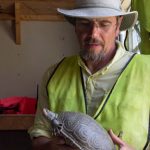Return
The Regulation of Population Growth
Dr. Willem M. Roosenburg leads a discussion on whether we can effectively regulate human population growth and simultaneously accommodate the sociological, political, and religious freedoms to which we have become accustomed. He also explores the question: If we don’t regulate population growth, where will it take us at the current rate and how might it be controlled naturally?
About the film
The year is 2027, and women can no longer give birth. The youngest inhabitant of the planet has just died at the age of 18, and all hope for humanity has been lost. As civilization descends into chaos, a dying world finds one last chance for survival in the form of a woman who has become inexplicably pregnant. Now, as warring nationalistic sects clash and British leaders try to maintain their totalitarian stronghold on the country, a disillusioned bureaucrat (Clive Owen) is brought back into the fold of activism by his guerrilla ex-wife (Julianne Moore). Reluctantly, he takes on the daunting task of escorting Kee (Claire-Hope Ashitey), the refugee who represents humankind’s last hope for survival, out of harm’s way and into the care of a mysterious organization known as The Human Project. Chiwetel Ejiofor, Charlie Hunnam, and Michael Caine co-star in this adaptation of author P.D. James’s gripping 1992 novel.
About the speaker
 From Dr. Willem M. Roosenburg’s Ohio University bio:
From Dr. Willem M. Roosenburg’s Ohio University bio:
“In my research, I investigate the evolution of life history traits (e.g. survivorship, reproductive rates, age of first reproduction etc.) and the conservation biology (extinction and loss of biodiversity due to anthropomorphic causes) of long-lived organisms. My research philosophy is to develop a species of interest as a model system and to gain a mechanistic understanding of how environmental variation affects population dynamics of that species, using a variety of tools. I combine demographic and experimental techniques to observe variation within populations and to predict the outcome of environmental perturbations on survivorship and reproductive rates. The utility of my approach is that it allows me to simultaneously address basic ecological and evolutionary questions as well as conservation and management issues. My research focuses on how population structure, behavior, and offspring phenotype are influenced by the interaction between the incubation environment and environmental sex determination (ESD), a peculiar sex determining system in which the sex of the developing embryos is determined by the incubation temperature after the eggs are laid.”
Return
Science on Screen® is an initiative of the Coolidge Corner Theatre, with major support from the Alfred P. Sloan Foundation. The Science on Screen program pairs films with a short talk with a scientist or technology expert. The free Science on Screen events are fun and engaging, offering dynamic speakers an unexpected jumping point to teach their field of expertise in a way that is accessible to a diverse audience.

Free admission to this event is provided by Arts for OHIO.



 109
109 

